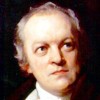To see a World in a Grain of Sand
And a Heaven in a Wild Flower,
Hold Infinity in the palm of your hand
And Eternity in an hour.William Blake (1757-1827) English poet, mystic, artist
“Auguries of Innocence,” l. 1 (1803)
(Source)
Quotations by:
Blake, William
He who shall hurt the little wren
Shall never be beloved by men.William Blake (1757-1827) English poet, mystic, artist
“Auguries of Innocence,” l. 29 (1803)
(Source)
A dog starved at his master’s gate
Predicts the ruin of the state.William Blake (1757-1827) English poet, mystic, artist
“Auguries of Innocence,” l. 9 (1803)
(Source)
The strongest poison ever known
Came from Caesar’s laurel crown.William Blake (1757-1827) English poet, mystic, artist
“Auguries of Innocence,” l. 97 (1803)
(Source)
A robin redbreast in a cage
Puts all Heaven in a rage.
A truth that’s told with bad intent
Beats all the lies you can invent.William Blake (1757-1827) English poet, mystic, artist
“Auguries of Innocence,” l.53 (1803)
(Source)
Can I see another’s woe,
And not be in sorrow too?
Can I see another’s grief,
And not seek for kind relief?William Blake (1757-1827) English poet, mystic, artist
“On Another’s Sorrow,” st. 1, Songs of Innocence and of Experience (1789)
(Source)
But if at the Church they would give us some ale,
And a pleasant fire, our souls to regale,
We’d sing and we’d pray all the live-long day,
Nor ever once wish from the Church to stray.
… And God like a father rejoicing to see
His children as pleasant and happy as he,
Would have no more quarrel with the Devil or the barrel,
But kiss him and give him both drink and apparel.
Nothing can be more contemptible than to suppose Public RECORDS to be True.
William Blake (1757-1827) English poet, mystic, artist
Annotations to “An Apology for the Bible” by R. Watson (1797)
(Source)
That the Jews assumed a right Exclusively to the benefits of God will be a lasting witness against them. And the same will it be of Christians.
William Blake (1757-1827) English poet, mystic, artist
Annotations to “An Apology for the Bible” by R. Watson (1797)
(Source)
Acts themselves alone are history, and these are neither the exclusive property of Hume, Gibbon nor Voltaire, Echard, Rapin, Plutarch, nor Herodotus. Tell me the Acts, O historian, and leave me to reason upon them as I please; away with your reasoning and your rubbish. All that is not action is not worth reading.
It is easier to forgive an Enemy than to forgive a Friend!
William Blake (1757-1827) English poet, mystic, artist
Jerusalem: The Emanation of the Giant Albion (c. 1803–20)
(Source)
He who would do good to another must do it in minute particulars;
General good is the plea of the scoundrel, hypocrite, and flatterer:
For art and science cannot exist but in minutely organized Particulars.William Blake (1757-1827) English poet, mystic, artist
Jerusalem: The Emanation of the Giant Albion, ch. 3, plate 55, l. 60 (c. 1803–20)
(Source)
And did those feet in ancient time,
Walk upon England’s mountains green?
And was the holy Lamb of God
On England’s pleasant pastures seen?
And did the Countenance Divine
Shine forth upon our clouded hills?
And was Jerusalem builded here
Among these dark Satanic mills?
A man who never alters his opinion is like standing water, and breeds reptiles of the mind.
William Blake (1757-1827) English poet, mystic, artist
The Marriage of Heaven and Hell, “A Memorable Fancy” (1790)
(Source)
What is now proved was once only imagined.
William Blake (1757-1827) English poet, mystic, artist
The Marriage of Heaven and Hell, “Proverbs of Hell” (1790–93)
(Source)
Prisons are built with stones of law, brothels with bricks of religion.
William Blake (1757-1827) English poet, mystic, artist
The Marriage of Heaven and Hell, “Proverbs of Hell”, l. 21 (1790–93)
(Source)
You never know what is enough until you know what is more than enough.
William Blake (1757-1827) English poet, mystic, artist
The Marriage of Heaven and Hell, “Proverbs of Hell”, l. 46 (1790-93)
(Source)
The ancient poets animated all objects with Gods or Geniuses, calling them by the names and adorning them with the properties of woods, rivers, mountains, lakes, cities, nations, and whatever their enlarged & numerous senses could perceive. And particularly they studied the genius of each city & country, placing it under its mental deity; Till a system was formed, which some took advantage of, & enslav’d the vulgar by attempting to realize or abstract the mental deities from their objects: thus began priesthood; Choosing forms of worship from poetic tales. And at length they pronounc’d that the Gods had order’d such things. Thus men forgot that all deities reside in the human breast.
William Blake (1757-1827) English poet, mystic, artist
The Marriage of Heaven and Hell, “Proverbs of Hell”, l. 71 (1790–93)
(Source)
Without contraries is no progression. Attraction and repulsion, reason and energy, love and hate, are necessary to human existence.
William Blake (1757-1827) English poet, mystic, artist
The Marriage of Heaven and Hell, “The Argument” (1790–93)
(Source)
I have written this Poem from immediate Dictation, twelve or sometimes twenty or thirty lines at a time, without Premeditation and even against my Will; the Time it has taken in writing was thus render’d Non Existent, and an immense Poem Exists which seems to be the Labor of a long life, all produc’d without Labor or Study.

